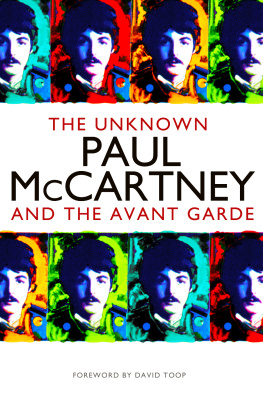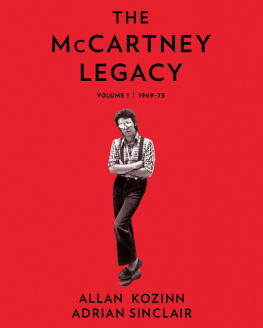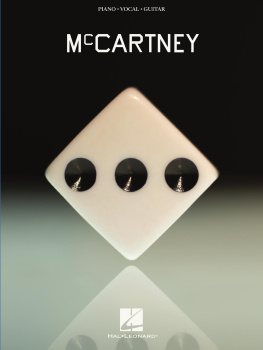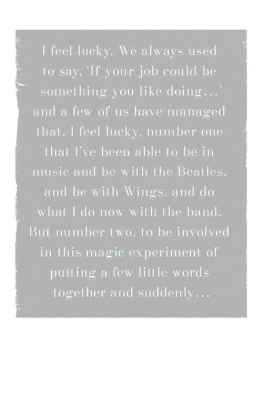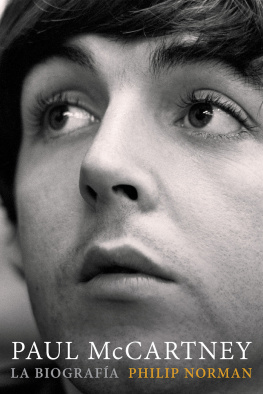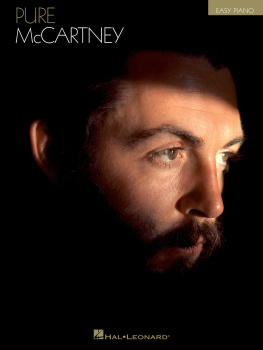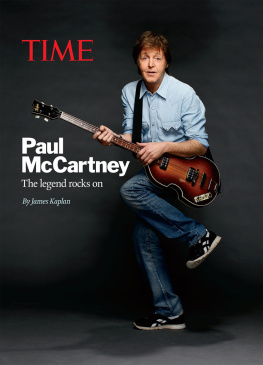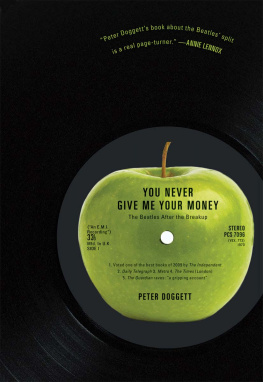
THE UNKNOWN PAUL MCCARTNEY
McCartney and the Avant-Garde
Ian Peel
TITAN BOOKS
The Unknown Paul McCartney
McCartney and the Avant-Garde
E-book ISBN: 9781781162750
Published by
Titan Books
A division of Titan Publishing Group Ltd
144 Southwark Street
London
SE1 0UP
First edition: April 2013
This is a work of fiction. Names, characters, places, and incidents either are the product of the authors imagination or are used fictitiously, and any resemblance to actual persons, living or dead, business establishments, events, or locales is entirely coincidental. The publisher does not have any control over and does not assume any responsibility for author or third-party websites or their content.
Copyright 2002, 2013 by Ian Peel. All rights reserved.
No part of this publication may be reproduced, stored in a retrieval system, or transmitted, in any form or by any means without the prior written permission of the publisher, nor be otherwise circulated in any form of binding or cover other than that in which it is published and without a similar condition being imposed on the subsequent purchaser.
A CIP catalogue record for this title is available from the British Library.
Did you enjoy this book? We love to hear from our readers. Please email us at readerfeedback@titanemail.com or write to us at Reader Feedback at the above address.
To receive advance information, news, competitions, and exclusive offers online, please sign up for the Titan newsletter on our website: www.titanbooks.com
For Kristianna
FOREWORD
B y the end of the 21st century, the cultural schematics we use today will look very quaint a bit like those antique maps that would fill some vast area of uncharted territory with a drawing of a poorly observed rhinoceros or spouting whale. Terms such as avant-garde, popular, classical, highbrow, lowbrow, mainstream, middle-of-the-road and experimental began to sound bleached out and pointless during the 1960s. Too many movements, individuals and events contributed to that seismic shift to be named here, but The Beatles were as important as anybody.
They created a happy confusion of perception whereby a single record could be appreciated on many different levels without harming either its sales, its artistic impact or coherence. All those genres that recoiled from miscegenation seemed legitimated and somehow socialised within a Beatles album. There was a party. Carl Perkins, Smokey Robinson, Bob Dylan, Karlheinz Stockhausen, Ravi Shankar and The Goons were invited. There were tensions and arguments but by the end of the night, everybody agreed that they had a good time.
Though Lennon and McCartney could write unforgettable songs at a rate that was almost supernatural, they played with sound within each song. Arranging, to use an old-fashioned word, seemed to be an innate skill for all four Beatles. That organic relationship between sonics and structure, reinforced by the experiences of George Martin, led them to electronic music, free improvisation, performance art, minimalism, loops, ambient sound, world musics, collage and noise.
Underestimating the importance of those discoveries is impossible. Composers such as James Tenney, Toru Takemitsu and Terry Riley had sampled and collaged popular musicians to remarkable effect but, even now, their efforts in that area are barely known. Whatever The Beatles did was an event of huge proportions. A general conception of what was possible, or acceptable, was amplified to a similar scale and the influence continues to be felt.
Some of the walls broken down in those heady times have been rebuilt. Somehow its difficult to imagine a band as complex, versatile and utterly essential as The Beatles existing now, and besides, experimentation no longer has the same impact. Inevitably, an extensive mythology has accumulated since the 1960s. Understanding the events of that time, their context and the interrelationship of all the characters involved demands research that goes beyond that mythology, along with its deeply rooted images and icons.
What did it mean, chewing vegetables with Brian Wilson? In his various guises and disguises over the years, Paul McCartney has suggested some answers to that question. The chewing, the nature of the question and many of the answers are documented in the pages that follow.
David Toop
author of Rap Attack, Ocean of Sound and Exotica
August 2002
PREFACE
I remember once saying to John that I was going to do an [avant-garde] album called Paul McCartney Goes Too Far. He was really tickled with that idea. Thats great, man! You should do it! But I would calculate and think no, Id better do Hey Jude.
Paul McCartney on Radio 1, 1990
Y ou wont believe what youre about to hear. Or if you do believe it, you might be surprised at who you are hearing it from. This is the story of Paul McCartneys sound experiments and pseudonyms, from tape loops to trance.
Ballads and babies. Thats what happened to me, is how Paul McCartney summed up his post-Beatles career in a 1970s interview with Time magazine. It was later used as the closing quote of a McCartney biography in 1997, but actually makes the perfect opening for this book, which extends the artists story a million miles from the ballads, the middle of the road and the rock and roll he is synonymous with.
Since the mid-1960s, Paul McCartney has explored various different fields of avant-garde music on albums, singles, remixes, soundtracks and live performance. Almost every one of these has been carried out either under a pseudonym or completely anonymously, rarely if ever under the name Paul McCartney. Why is this? What avant-garde music has he produced? What are the musical inspirations behind this work? And what are his motivations in continually dabbling away from the mainstream songs he is most famous for?
The Beatles musical experiments have been examined to death. But from there on in its uncharted territory. Between MacDonald, Miles and The Beatles Anthology you have all you need to build a picture of the 1960s, The Beatles and (most of) their avant-garde work at the time. This book continues the story, connecting all the experimental ideas from that period against a backdrop of influences from the decades before, and linking them to McCartneys work from 1970 to the present day.
The Unknown Paul McCartney doesnt set out to paint the artist as being seminally important to the avant-garde. It merely aims to put the experimental ten per cent of his music into the frame. Experimental composers such as Stockhausen and Cage are often mentioned as influences on The Beatles in the psychedelic era. But these and many other musicians, sounds and ideas from the left field of music continue to influence McCartney to this day.
In 1969, McCartney and Ringo Starr were the only Beatles who hadnt released avant-garde solo albums. Lennon and Yoko Onos Unfinished Music No. 1/Two Virgins was already infamous. One hour of screaming, electronic effects and tape loops. It was followed by more madness in music Unfinished Music No. 2/Life with the Lions and The Wedding Album. In 1969, George Harrison released Electronic Sound a full albums worth of his (and other peoples) Moog synthesiser test-recordings. This followed the early world music of Harrisons Wonderwall Music film soundtrack.
Although equally active in the underground experimental scene, McCartneys work was less visible during the sixties. By 1970 the other Beatles had all but abandoned their avant-garde experiments, but McCartney was just getting started. All the influences he picked up in the psychedelic era leaked out from both his solo work and obscure Wings recordings until, in the 1990s, he embraced his avant-garde side and a flood of collaborations and recordings emerged, ranging from freeform post-rock to chill-out.
Next page
